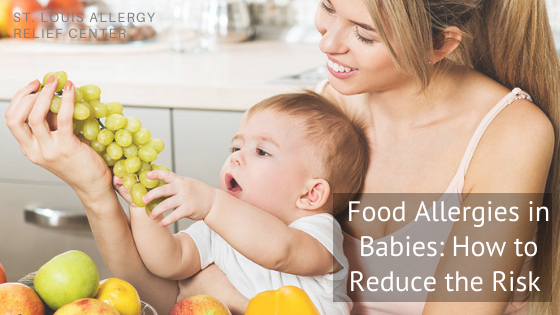Food Allergies in Babies: How to Reduce the Risk

Reduce the risk of developing food allergies in babies
We all want the best for our babies, for them to grow strong and healthy and live the best lives possible. Over a decade ago, it was believed that common food allergens should not be introduced to babies until they were preferably almost five years old.
Contrary to former belief, recent research evidence suggests that the introduction of common food allergens early on may possibly reduce your child’s risk of developing a food allergy or sensitivity later in life. Peanuts, eggs, milk, fish, and wheat are among the most common food allergies that parents fear. For years pediatricians suggested that parents refrain from feeding their babies these food allergens believing that the only way to reduce the risk of your children developing an allergy to food is if they are introduced later in life.
How things change. Today, pediatricians now say the opposite appears true; the earlier the introduction, the lower the risk of developing an allergy to food; and a delay in introduction can increase the chances of a food allergy developing. Though there is no concrete evidence on whether introducing food to your baby will prevent your child from ever developing food allergies or sensitivities, it appears to significantly lower the risk.
Continue reading to reveal new insight on early food allergen introduction to babies.
In the womb
Inside the womb and during infancy are the most important times for a baby’s development. Many parents want to do everything they can to ensure that their babies’ grow into healthy kids and eventually adults. For many years, the idea of introducing your child to food allergens was taboo, parents would stray away from eating shellfish, peanuts or eggs during pregnancy or while breastfeeding. This was done to lower the risk of their child developing food allergies. There is no evidence, however, that justifies that avoiding allergenic foods prevents the development of allergic conditions.
Breastfeeding plays an important, some say critical, part in a baby’s development. Breastmilk provides essential nutrients and benefits that your child needs in babyhood, especially the first 4to 12 months of life. It is suggested that mothers breastfeed for as long as they can because it strengthens the immune system of the child. Through breastmilk, your child becomes gradually exposed to food allergens which allow the baby to build a tolerance to them. Unless someone in your immediate family has an allergy to food, it is safe to say that nursing mothers do not need to limit the food that they consume while breastfeeding. The introduction of these foods is just as important during pregnancy as it is beyond the womb.
Sooner, rather than later
Research suggests that children introduced to food allergens between four to twelve months had a lower risk for food allergies than those who were introduced at the age of five years old. Doctors today recommend all babies, both high and low risk, should be introduced to these foods to reduce their chances of developing an allergic condition. Most babies are able to eat solid food at around four to six months. Today the prevailing thought is that babies who are at high risk for allergies should be introduced to these foods as early as four months. The gastrointestinal tracts of babies contain immune cells that when exposed to allergenic proteins can build a tolerance to such proteins.
Research now indicates that as long as the child is introduced to the allergen in a controlled fashion and does not have siblings or parents who have a food allergy, it is ok to introduce the food slowly. In fact, the American Academy of Allergy Asthma and Immunology recommendations now state that once an infant over 4 to 6 months old has tolerated a few non–allergenic solid foods (think common early solids like rice cereal, oatmeal, sweet potatoes, carrots, bananas, apples or pears), parents can proceed with introducing other more allergenic foods.

However, you should only present peanuts and eggs to your baby along with other foods, such as vegetables, fruits, or grains, that you already know your child shows no sensitivity toward. Once you have introduced the food, continue offering your child those foods in order for him/her to develop a tolerance against allergies to them. Most babies have eczema as a result of food allergies, so pay close attention to what you feed your child if they show any signs of eczema or skin changes. Remember to never introduce foods that present a choking hazard to babies under two years old.
Researchers have noted that children who eat foods such as peanut butter as babies and don’t eat it again for a while do not develop a peanut allergy later in life. It has also been discovered that children who eat fish as babies do not have eczema after the one-year mark. Current studies indicate that prevention happens early on, so do all that you can now to prevent your child from dealing with food allergies in the future. Apparently, it’s better to introduce allergenic foods sooner rather than later.
Be safe and use common sense
After all your concerns have been washed away, here are some common-sense safety tips to remember when introducing your child to the more allergenic foods:

After years of being advised to wait to feed your kids these food allergens, it may seem daunting to take that risk, but the medical profession is assuring a new generation of moms that an early introduction is more help than harm. To be on the safe side, if there are no food allergies or sensitivities in your family, there should very little risk to introducing most babies to allergens early; in fact, the long-term reward may be in lowering the chances of your child ever having a food allergy at all
If your child suffers from allergies and you have been unsuccessful with allergy treatments or are looking for something different, St. Louis Allergy Relief Center treats allergies holistically without pain, needles or pills. We are an allergy wellness center, specializing only in natural treatments. We specialize in holistic, natural allergy treatments using Advanced Allergy Therapeutics (AAT). AAT treatments are painless and non-invasive, involving no shots or needles, no drugs or herbal supplements, and no avoidance. We provide you with a detailed treatment plan after completing a comprehensive assessment to determine environmental stressors that may be triggering allergies or allergy-like symptoms. Visit our website https://stlouisallergyrelief.com/ to learn more or call us at 314-384-9304.
We also deliver community workshops as well as a free monthly informational workshop on the first Thursday of every month at 5:45 pm in our Chesterfield office. Our free monthly workshop provides the public with information on our unique approach to allergy treatments and includes an opportunity to meet with our patients for a question and answer session. If you are interested in attending one of our free monthly workshops, seating is limited so please call our office at 314-384-9304 to reserve your space.
Sources:
https://www.healthlinkbc.ca/healthy-eating/reducing-baby-food-allergy-risk
https://www.cnn.com/2019/03/18/health/food-introduction-allergies-report/index.html
